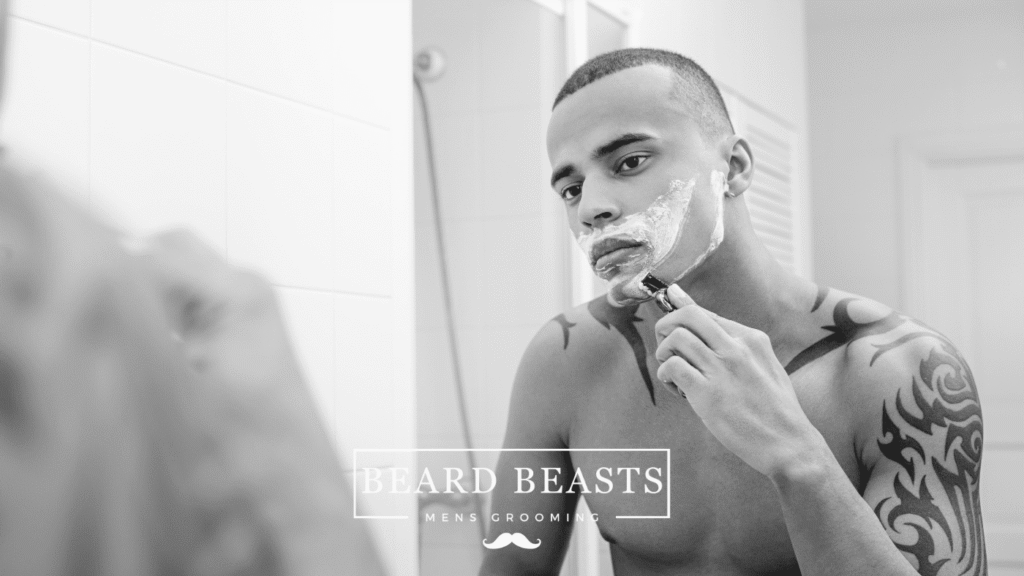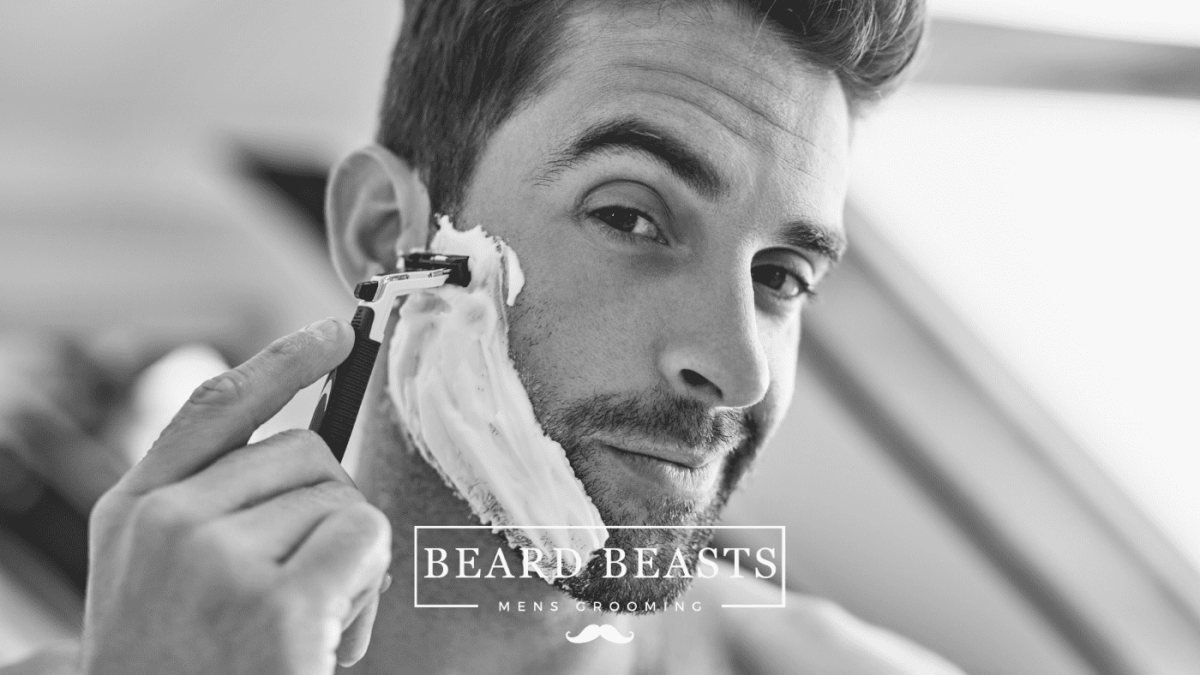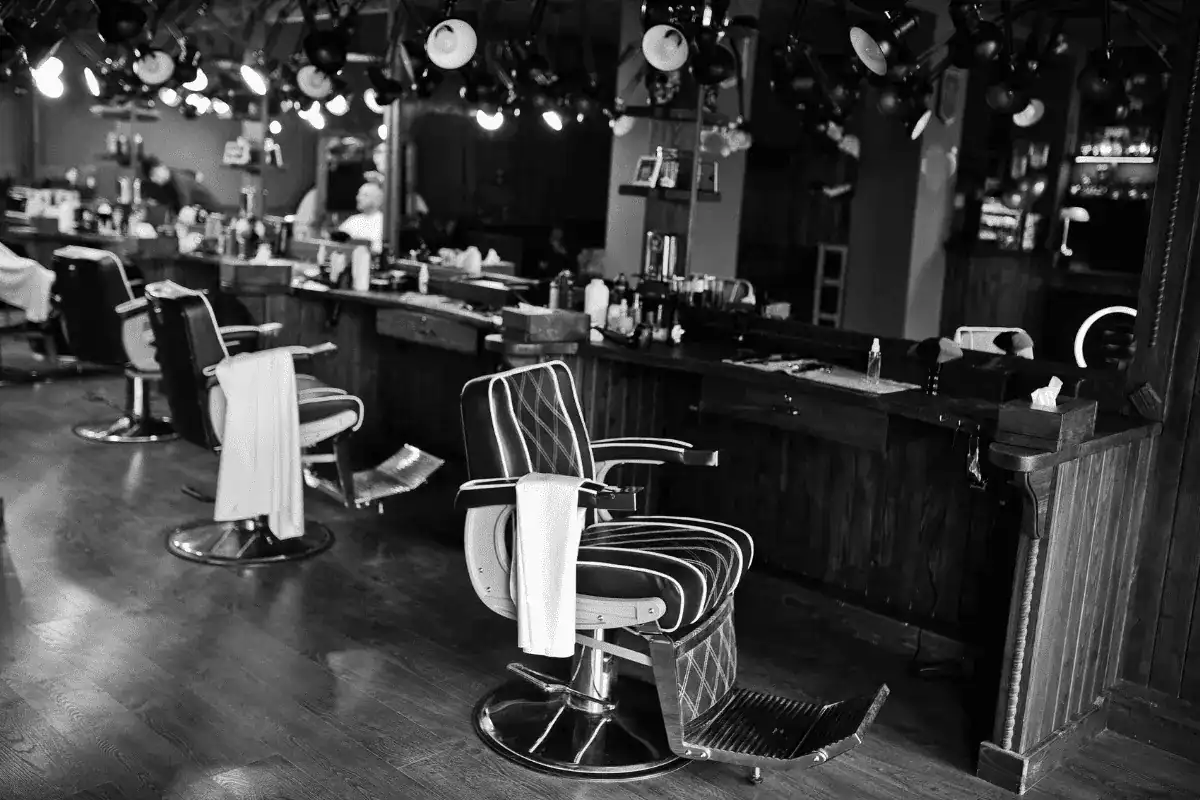Deciding should you shave before or after a shower? is a simple question that many men contemplate, yet it holds the key to a more comfortable and effective shaving routine. This choice can greatly influence the quality of your shave, your skin’s health, and your overall grooming experience.
In this article, we’ll dive into the benefits and considerations of shaving before versus after a shower, providing insights to help you tailor your shaving routine to suit your skin type and preferences. Whether you’re looking to enhance your shave, reduce irritation, or simply streamline your grooming process, understanding the best time to shave in relation to showering can make all the difference.
Understanding Your Shave
Navigating the world of shaving can sometimes feel like a complex journey, especially when faced with the question: Should you shave before or after a shower? Understanding the basics of a good shave and how to prepare your skin are crucial steps in making this decision. Let’s dive into the essentials of a quality shaving experience.

The Basics of a Good Shave
Know Your Skin and Hair: The first step to a great shave is understanding your skin type and facial hair texture. Whether you have sensitive skin prone to irritation or a thick beard that requires a bit more effort, knowing these details can guide you in choosing the right shaving method.
Shaving Tools and Products: There’s a vast array of shaving tools and products available, from razors and electric shavers to creams, gels, and aftershaves. Selecting the right tools is vital. For example, a safety razor might suit someone with coarse hair better, while a shaving gel could be ideal for those with sensitive skin to see where they’re shaving and avoid nicks and cuts.
Preparing Your Skin for Shaving
Water Temperature and Hydration: Hydrating your skin is essential, and the role of water temperature here cannot be overstated. Warm water can help open up pores and soften facial hair, making the shave smoother. This is why many ponder whether to shave before or after a shower, as post-shower skin is ideally hydrated and prepped for shaving.
Pre-Shave Skin Care Tips: Preparing your skin with a pre-shave routine can significantly enhance your shaving experience. Washing your face with a gentle cleanser removes excess oil and dirt, providing a clean base for shaving. Applying a DIY shave oil can also protect your skin by creating a barrier between the blade and your skin, reducing the risk of irritation.
Whether you’re pondering, should you shave before or after a shower? the key to a comfortable and close shave lies in understanding and caring for your skin. By selecting suitable tools and products and following a thoughtful pre-shave skin care routine, you can ensure a smoother shave and healthier skin. Remember, the best shaving practice is the one that fits your unique skin type and lifestyle.
The Benefits of Shaving Before a Shower
While the question should you shave before or after a shower reflects a personal choice, it can significantly affect your shaving experience and skin health. Let’s explore why some men opt to shave before taking a shower and how to do it effectively.
Why Some Men Prefer It
Convenience and Time-Saving: For many, shaving before a shower offers a quick and efficient routine that fits seamlessly into their busy schedules. It eliminates the wait for pores to open or hair to soften as you can immediately get on with your day after showering.
Suitability for Certain Skin Types and Facial Hair Textures: Men with less sensitive skin or finer facial hair may find that shaving before a shower works better for them. It can provide a sufficient shave without the need for the extra softening that shower steam provides, reducing the risk of irritation for those with hardier skin.
Best Practices for Pre-Shower Shaving
Recommended Shaving Products and Tools: Opting for a pre-shower shave doesn’t mean skimping on quality products. Use a sharp razor to minimize tugging and a protective shaving cream or gel to reduce friction. Pre-shave oils can also be beneficial, forming a barrier that allows the razor to glide more smoothly over the skin.
Techniques for Minimizing Skin Irritation: To ensure a comfortable shave before you shower, start by washing your face with warm water to remove excess oil and dirt. Apply shaving cream generously and shave in the direction of hair growth to avoid irritation and ingrown beard hairs. After shaving, splash your face with cold water to close the pores before stepping into the shower.
Shaving before a shower can be a convenient and effective routine for those looking to save time or those whose skin and hair type accommodate it well. By choosing the right products and employing techniques that protect the skin, you can achieve a smooth shave that leaves your skin feeling refreshed and ready for the day. Remember, the decision on whether you should shave before or after a shower ultimately depends on what works best for your skin and lifestyle.
The Advantages of Shaving After a Shower
For many, the debate on Should you shave before or after a shower leans towards the latter for several good reasons. Shaving after a shower can significantly enhance the overall experience and result in a smoother, more comfortable shave. Let’s delve into why this method is preferred by some and how to do it correctly.
Enhancing the Shaving Experience
How Steam and Warmth Improve the Shave: The steam and warmth from a shower help open up the pores and soften the facial hair, making it easier for the razor to glide across the skin. This not only allows for a closer shave but also significantly reduces the chances of nicks, cuts, and razor burn, leading to a more pleasant shaving experience.
Benefits for Skin Health and Reducing Razor Burn: The moisture from a warm shower hydrates the skin, making it more pliable and less prone to irritation. This hydration is crucial for preventing razor burn and ensuring the skin remains healthy and smooth post-shave.
Post-Shower Shaving Techniques
Step-by-Step Guide for a Closer, Smoother Shave:
- Start with a Clean Slate: After your shower, gently pat your face dry, leaving it slightly damp to maintain the moisture.
- Apply a Quality Shaving Cream or Gel: Choose a product that suits your skin type to help protect against irritation. Apply it evenly to further soften the hair and enhance razor glide.
- Use a Sharp Razor: A sharp, clean razor is essential for a close shave without tugging or pulling. Make sure to rinse it frequently as you shave.
- Shave with the Grain: For the least irritation, shave in the direction of hair growth. If needed, a second pass can be made carefully against the grain for an even closer shave.
- Rinse and Pat Dry: Rinse your face with cool water to close the pores and gently pat your skin dry with a clean towel.
Recommended After-Shave Skin Care Routines:
- Soothe Your Skin: Apply an alcohol-free post shave balm or moisturizer to soothe and hydrate the skin, helping to repair any irritation and maintain skin health.
- Hydrate: Keeping your skin well-hydrated after shaving helps to lock in moisture, promote healing, and enhance the skin’s natural barrier.
Should you shave before or after a shower is a common question with varying answers depending on individual needs. Shaving after a shower offers numerous advantages, such as improved skin health, a closer shave, and a more enjoyable experience.
Utilizing proper post-shower shaving techniques and following up with a nurturing after-shave skin care routine can ensure your skin stays smooth, healthy, and irritation-free. Ultimately, whether you should shave before or after a shower hinges on your personal preference, skin type, and lifestyle. However, the benefits of post-shower shaving are significant and worth considering in your grooming routine.
Should You Shave Before or After a Shower?Making the Right Choice
When it comes to deciding Should you shave before or after a shower?, the answer isn’t one-size-fits-all. It’s about understanding your skin’s specific needs and how your shaving routine can best meet them. Let’s delve into the factors that can help you make the right choice for your skin.
Factors to Consider
Skin Sensitivity and Irritation: If you’re someone who experiences skin irritation or razor burn easily, the timing of your shave in relation to showering can make a big difference. Pay attention to how your skin reacts to shaving before versus after a shower to determine which method causes less discomfort.
Facial Hair Type and Growth Pattern: The texture and growth direction of your facial hair can also influence your decision. Coarse or curly hair might benefit from the softening effect of a warm shower, while finer hair may not require this additional step.
Expert Advice and Dermatologist Recommendations
Insights from Skincare Professionals: Dermatologists and skincare experts often highlight the importance of prepping the skin for a shave. They may recommend shaving after a shower for those with sensitive skin to take advantage of the steam’s softening effects on hair and skin.
Tailoring Your Shaving Routine to Your Skin’s Needs: Ultimately, the best advice is to listen to your skin. Incorporate the suggestions of skincare professionals but adapt them based on your personal experience. For example, if you find that shaving before a shower works better for you, ensure you’re using the right products to protect your skin from irritation.
Deciding should you shave before or after a shower? hinges on your unique skin type, facial hair, and personal preference. It’s essential to consider skin sensitivity and adapt your shaving routine for the best results. Whether shaving before or after the shower, aim for a routine that ensures a comfortable shave and keeps your skin irritation-free.
Common Shaving Mistakes to Avoid
Whether you decide to shave before or after a shower, avoiding common shaving mistakes is key to a smooth, irritation-free shave. Understanding these pitfalls can help improve your shaving technique and product use, ensuring a better experience overall.
Overview of Typical Errors
Using Dull Blades: One of the most common mistakes is using a razor that’s past its prime. A dull blade can tug at the hair instead of cutting it cleanly, leading to irritation like razor bumps and cuts.
Skipping Pre-Shave Preparation: Neglecting skin preparation, such as not washing your face or failing to apply a pre-shave oil or cream, can result in a less effective shave and increase the risk of irritation.
Applying Too Much Pressure: Pressing the razor too hard against the skin is a frequent error that can cause nicks, cuts, and razor burn. The blade should glide over the skin, not scrape it.
Ignoring Grain Direction: Shaving against the grain can offer a closer shave but at the cost of higher irritation and ingrown hairs. It’s generally safer to shave with the grain, especially for those with sensitive skin.
Tips for Improving Shaving Technique and Product Use
Choose the Right Time: Deciding whether you should shave before or after a shower depends on your skin and hair type. Use the benefits of each method to your advantage.
Invest in Quality Tools: A high-quality razor and shaving products can make a significant difference. Look for razors that fit your skin type and shaving creams or gels that offer good lubrication.
Take It Slow: Rushing through your shave increases the chance of mistakes. Take your time to ensure you’re shaving effectively and gently.
Aftercare Is Essential: Whether you shave before or after your shower, applying a soothing aftershave or moisturizer can help calm the skin and prevent irritation.
Avoiding common shaving mistakes and improving your shaving technique can enhance your experience, regardless of when you choose to shave in relation to your shower. By understanding the typical errors and implementing these tips, you can achieve a smoother, more comfortable shave that leaves your skin looking and feeling its best. Remember, the goal is not just about removing hair but also caring for your skin in the process.
FAQs on Shaving in Relation to Showering
When it comes to shaving, everyone has their routine, but questions and myths abound, especially regarding whether you should shave before or after a shower. Let’s address some common inquiries and clear up any confusion.
Is it better to shave before or after a shower?
The answer depends on your skin and hair type. Shaving after a shower can be beneficial for those with sensitive skin or coarse hair, as the steam softens hair and opens pores. However, if you’re pressed for time or have less sensitive skin, shaving before may suit you just fine.
Can shaving after a shower reduce razor burn?
Yes, the warmth and moisture from a shower can soften your hair and prepare your skin for a closer shave, potentially reducing the chance of razor burn.
Will shaving before a shower cause more nicks and cuts?
Not necessarily. If you use a sharp razor and proper shaving cream or gel, you can still achieve a smooth shave before showering. The key is to ensure your face is moist and not completely dry during the shave.
Do I need to use hot water when shaving?
Warm water is ideal, whether you’re shaving before or after a shower. It helps soften the hair and can make the shaving process smoother. However, too hot water can irritate the skin, so aim for a comfortable warmth.
Is it a myth that your hair grows back thicker if you shave more often?
Yes, this is a myth. Shaving cuts the hair at the surface of your skin, so it doesn’t affect the thickness or rate of hair growth. The blunt tip of the regrowing hair may feel coarse or “thicker,” but the hair is not actually changing in texture.
Should I change my shaving routine if my skin is irritated?
If you experience irritation, consider whether shaving before or after a shower works best for you. Additionally, look into gentler shaving creams, sharper razors, and aftershave products designed to soothe the skin. Sometimes, small adjustments can make a big difference.
It’s important to understand that the question, should you shave before or after a shower is a personal decision that can vary based on individual skin and hair needs. By addressing these FAQs, we hope to have provided clarity and dispelled some common myths, helping you to refine your shaving routine for the best results. Remember, the most important factors are understanding your skin’s needs and adapting your routine to suit those best.
Concluding Should You Shave Before Or After A Shower?
Deciding on the debate, should you shave before or after a shower is more than just a personal preference—it’s about understanding what works best for your skin and facial hair. Throughout this article, we’ve explored the benefits and considerations of both approaches, aiming to provide you with the insights needed to enhance your shaving experience.
Key Takeaways:
- Personalize Your Routine: Whether shaving before or after a shower, the best approach is the one that suits your skin type, facial hair texture, and lifestyle.
- Prepare and Protect Your Skin: Regardless of timing, preparing your skin with the right products and techniques is crucial to avoid irritation and achieve a smooth shave.
- Quality Tools Matter: Investing in high-quality shaving tools and products can significantly improve your shaving experience, reducing the risk of nicks, cuts, and razor burn.
- Listen to Your Skin: Pay attention to how your skin responds to your shaving routine and be willing to adjust based on its needs. If you experience irritation, consider switching up your routine or consulting with a dermatologist for personalized advice.
Ultimately, the question of Should you shave before or after a shower? doesn’t have a one-size-fits-all answer. It’s about experimenting with both methods and tailoring your routine to what feels best for you. By taking into account the tips and insights shared, you’re well on your way to a more comfortable and effective shave that leaves your skin feeling refreshed and cared for. Remember, the goal is not just to remove hair but to nurture your skin in the process.





